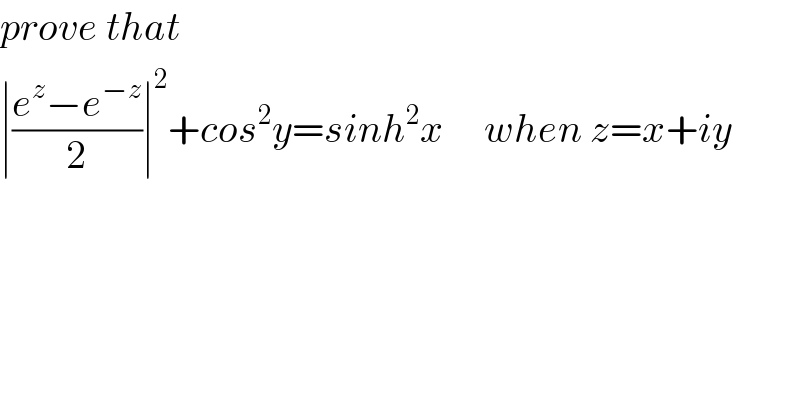
Question and Answers Forum
Question Number 88263 by M±th+et£s last updated on 09/Apr/20

Commented by M±th+et£s last updated on 09/Apr/20

Answered by TANMAY PANACEA. last updated on 09/Apr/20
![e^(x+iy) =e^x .e^(iy) =(coshx+sinhx)(cosy+isiny) =coshxcosy+icoshxsiny+sinhxcosy+isinhxsiny =cosy(coshx+sinhx)+isiny(coshx+sinhx) e^(−(x+iy)) =e^(−x) .e^(−iy) =(coshx−sinhx)(cosy−isiny) =coshxcosy−icoshxsiny−sinhxcosy+isinhxsiny =cosy(coshx−sinhx)−isiny(coshx−sinhx) now ((e^z −e^(−z) )/2)=(1/2)[cosy(2sinhx)+isiny(2coshx)] ∣((e^z −e^(−z) )/2)∣^2 =(cosysinhx)^2 +(sinycoshx)^2 cos^2 y(sinhx)^2 +sin^2 y(coshx)^2 +cos^2 y =cos^2 y[1+(sinhx)^2 ]+sin^2 y(coshx)^2 =cos^2 y[cos^2 hx−sin^2 hx+sin^2 hx]+sin^2 ycos^2 hx =(cos^2 y+sin^2 y)cos^2 hx =cos^2 hx pls check](Q88282.png)
Commented by M±th+et£s last updated on 09/Apr/20

Commented by TANMAY PANACEA. last updated on 09/Apr/20

